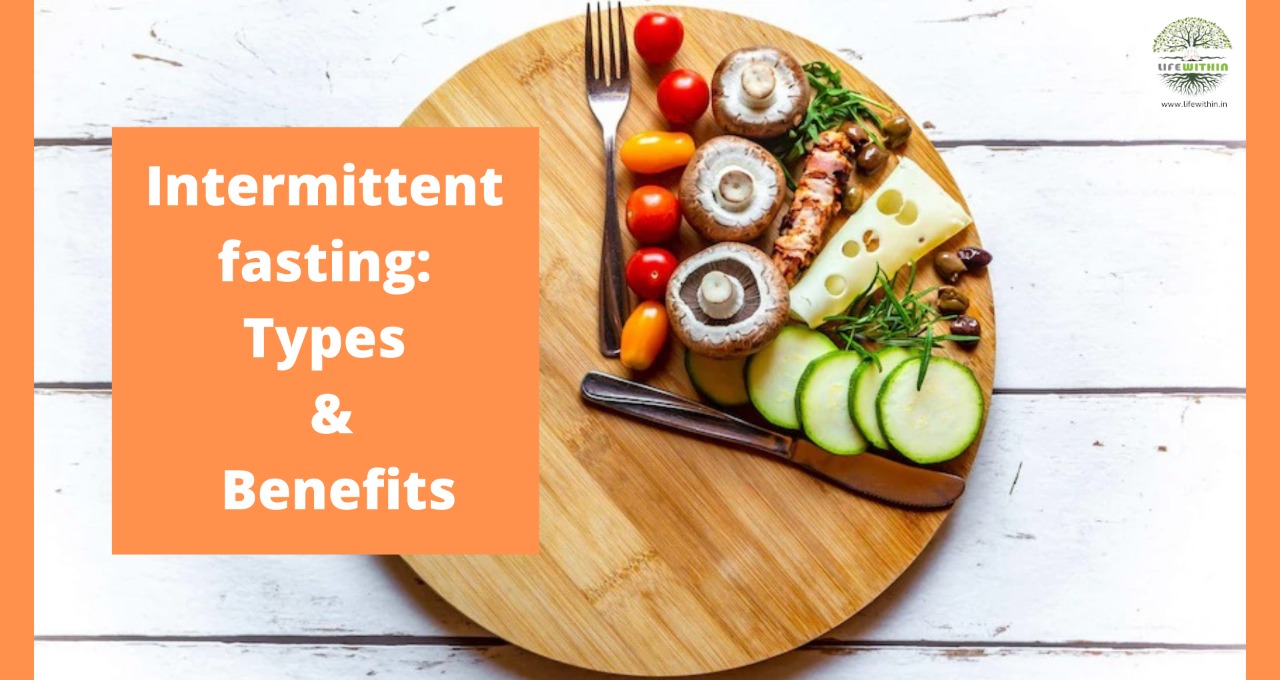Intermittent fasting: Types and Benefits
Weight loss can be accomplished in a number of ways. In recent years, intermittent fasting has become increasingly popul...
- by Sakshi Bisht
- Jan 28, 2022
- 2446 views

Weight loss can be accomplished in a number of ways. In recent years, intermittent fasting has become increasingly popular and effective. An intermittent fasting pattern involves regular periods of minimal or no food consumption - such as periodic periods of fasting. Intermittent fasting is commonly perceived as a weight-loss strategy. Fasting for short periods reduces calorie intake, resulting in weight loss over time.
The 16/8 method:
One of the most popular fasting plans for weight loss is the 16/8 intermittent fast. There is a set window of 8 hours each day during which food and calorie-containing beverages may be consumed. In the remaining 16 hours, one must abstain from food. As opposed to other diets, the 16/8 method uses a time-restricted feeding model (TRF) and is more flexible. It allows you to consume calories during an eight-hour period.
You can choose to skip breakfast and fast from noon to 8 PM or choose to avoid eating late and stick to a 9 a.m. - 5 p.m. routine. You can lose weight and reduce your blood pressure by limiting the number of hours you eat during the day. A lot of junk food or snacks during a 16/8 intermittent fast may negate its benefits. To maximize the potential health benefits of this diet, be sure to consume fruits, vegetables, whole grains, healthy fats, and protein.
The 5:2 method:
It is an intermittent fasting diet that is simple to follow. You eat normally five days a week and don't restrict calories. Additionally, you reduce your calorie consumption on the other two days of the week to one-quarter of your daily requirements. Someone who consumes 2,000 calories each day would have to reduce this to 500 calories a day, two days a week if they regularly consume 2,000 calories per day.
You choose which days to fast on when you follow the 5:2 diet, and there are no restrictions as to what or when you should consume food on your full-calorie days. Having said that, you should be aware that eating "normally" on full-calorie days does not give you free reign to eat anything you want.
Limiting yourself to just 500 calories a day is difficult, even if you only do it twice a week. You might also feel ill or faint if you consume too few calories. Although the 5:2 diet can be effective, it is not suitable for everyone. Consult your doctor to find out whether the 5:2 diet is right for you.
The Warrior diet:
Based on ancient warriors' eating patterns, the Warrior Diet is an intermittent fasting diet. This 2001 diet plan, developed by Ori Hofmekler, is a bit more extreme than the 16:8 diet, but is less restrictive than the Eat Fast Eat diet. A person follows the diet by eating very little food during the day for 20 hours and eating tons during a 4-hour window of time at night.
During the required 20-hour fast period, dieters are encouraged to consume low-calorie fluids and dairy items as well as hard-boiled eggs and raw fruits and vegetables. It is recommended for people to eat unprocessed, healthy, organic foods for a 4-hour window after this 20-hour fast. Due to the fact that substantial calories can only be consumed for four hours a day, the Warrior Diet can be difficult to follow. The tendency to overeat at night can be challenging.
Benefits:
A few hours of restricted eating each day can help you reduce your daily calorie intake, which will ultimately result in weight loss. A study has shown that intermittent fasting reduces fasting insulin levels and blood sugar levels, potentially reducing your risk of diabetes. It is believed that fasting increases insulin sensitivity, improves metabolic pathways, and leads to behavioural changes that together can extend your lifespan. Additionally, it has a range of benefits for metabolic health, possibly reducing the risk of cardiovascular disease as well.
Long-term success depends on your ability to stick with a diet plan. You will reap the benefits of intermittent fasting when you are able to stick to a healthy diet over the long term.
Things to keep in mind:
Food quality - What you eat still matters. Opt for whole foods and foods with few ingredients.
Calories - Calories still count, so try to eat normally during the non-fasting periods, not so much that you compensate for the calories you missed when fasting.
Consistency - You need to stick with it for an extended period if you want it to work, just as with any other weight loss method.
Patience - Your body may take some time to adapt to an intermittent fasting protocol. Just try to be consistent with your meal schedule, it’ll get easier and you’ll feel the change.
Sakshi Bisht | Life Within















